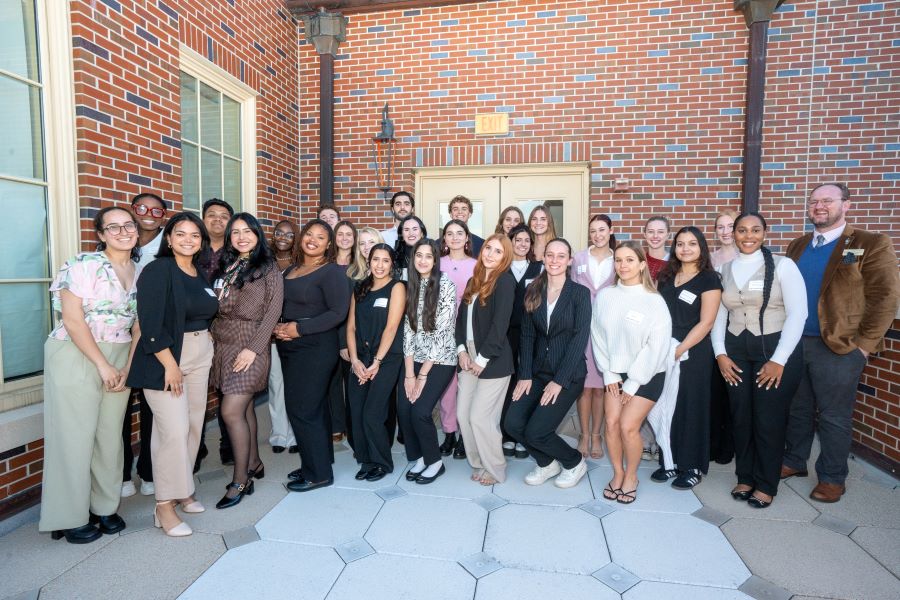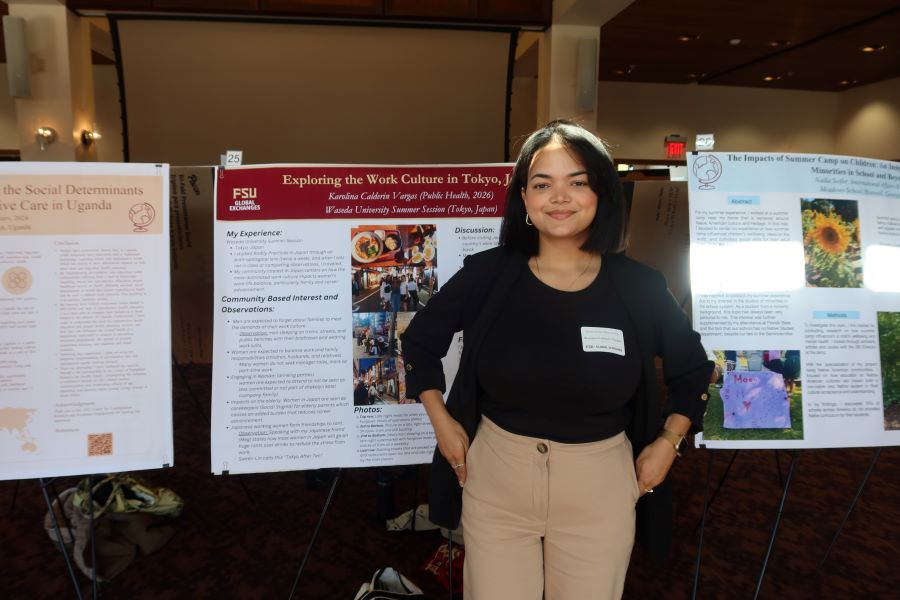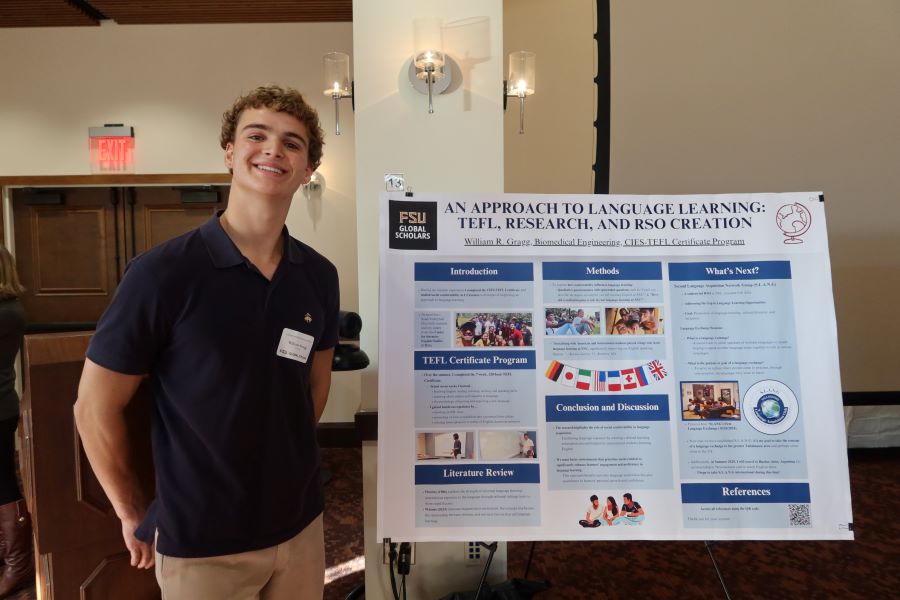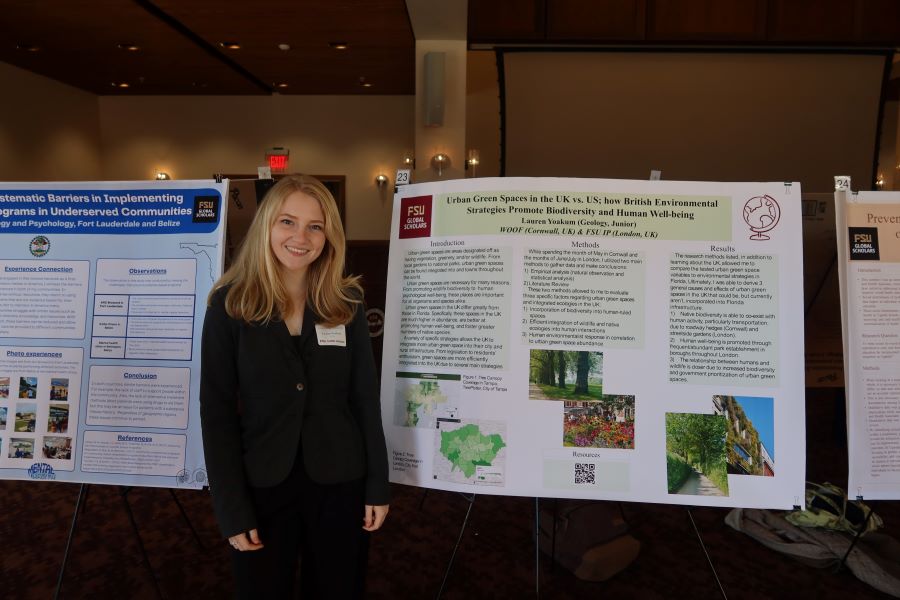
Planning a trip abroad or research project for the first time can be an intimidating task, especially as an undergraduate student with little to no experience. At Florida State University, the Global Scholars Program provides students with guidance and support as they plan and pursue their own student-designed learning experiences.
To highlight these experiences and their outcomes, the Global Scholars Program hosted its annual Global Scholars Showcase Dec. 6 at the Honors, Scholars, and Fellows (HSF) House. The event featured projects ranging from the role of health care systems in Spain to exploring the solidarity of immigration in Morocco and war related tourism in Eastern Europe.
Part of the Center for Undergraduate Research and Academic Engagement (CRE) at FSU, the Global Scholars Program is an experiential education program that helps train students to conduct independent, community-based learning opportunities. It offers a unique opportunity for undergraduate students to engage with critical questions about social impact, social justice, and social change through a combination of academic, classroom-based learning as well as independent research, internship, and/or service-learning experiences.
The program’s strong ‘global’ focus provides guidance and support to help students design their own independent, community-based, learning opportunities over the summer, which may include an online internship with a social impact organization (in the U.S. or abroad), an in-person internship with a social impact organization (in the U.S. or abroad), or a self-directed research project focusing on a social issue in a local context.
The program includes three phases. During the spring semester, students enroll in a theory course that teaches them about the ethics of community-based projects and how to use qualitative research to understand community impacts. The course also helps students determine their individualized levels of comfort and how to develop an experience and get it approved by FSU.
The next phase of the program is the student experience. The third phase of the program includes a reflection course during the fall semester that helps students think back on their experiences and prepare their presentations for the annual Global Scholars Showcase.
With the possibility of traveling around the globe, one of the goals of the program is to teach students to balance risk with the independent experiences they may pursue.
“The program’s design helps students learn how to assess personal risk in a given situation and plan for their future — assessing their own level of comfort for interaction,” said CRE Associate Director Warren Oliver, who runs the Global Scholars Program.
This year, the Global Scholars Program welcomed a cohort of 27 students who conducted experiences in 14 countries. Whether examining health through consumerism in Japan, learning about human rights in Kosovo, or interning with a non-governmental organization in Morocco, the program’s latest cohort continued to expand FSU’s reach around the globe.
Karolina Calderin Vargas, a junior pursuing a degree in public health, presented her project “Exploring the Work Culture in Tokyo, Japan” at the showcase. She studied at Waseda University in Japan this summer through one of FSU’s Global Exchange Programs. During the summer, Vargas traveled to Baba, just outside of Tokyo, where she took classes and participated in fieldwork to analyze how Japan views health care compared to the United States.

“All of the considerations from the program were interesting and important when going abroad,” Vargas said. “I didn’t think about how it would be like to take care of myself when I’m living in a foreign country for six weeks––the program had us consider how to be safe, comfortable and how to feel good about our experience. Being in Japan completely changed my life.”
William Gragg, a sophomore pursuing a degree in biomedical engineering, presented his project “An Approach to Language Learning: TEFL, Research, and RSO Creation” during the showcase. Gragg spent his summer obtaining a Teaching English as a Foreign Language (TEFL) Certificate from the Center for Intensive English Studies (CIES) at FSU.

During his summer at CIES, Gragg got to know and befriend students from all over the world, including places like Mexico, Kazakhstan and Spain. From this experience, Gragg created the Second Language Acquisition Network Group (SLANG), a registered student organization for those interested in learning different languages.
“The best way to learn a language is to engage with native speakers and immerse yourself in the culture through daily interactions,” Gragg said. “Through Global Scholars and Dr. Oliver’s guidance, I learned how I could take different methods of research and apply those into language acquisition and what I wanted to build here, which is SLANG.”
Lauren Yoakum, a junior pursuing a degree in geology, presented her project “Urban Green Spaces in the UK vs. US: How British Environmental Strategies Promote Biodiversity and Human Well-being.” Prior to participating in a summer session at the FSU London Study Centre through International Programs, Yoakum spent the first weeks of her summer in Cornwall, England, where she worked on a local farm in exchange for food and lodging through the organization WWOOF (World Wide Opportunities on Organic Farms).

“I knew I wanted an experience related to the environment and conservation, but I wasn’t exactly sure what to do,” Yoakum said. “Being part of Global Scholars helped me figure out the safest and most feasible options to do that. If I had been on my own, I would not have known that WWOOF was a good option.”
For more information about the Global Scholars Program, visit cre.fsu.edu/global/globalscholars.



